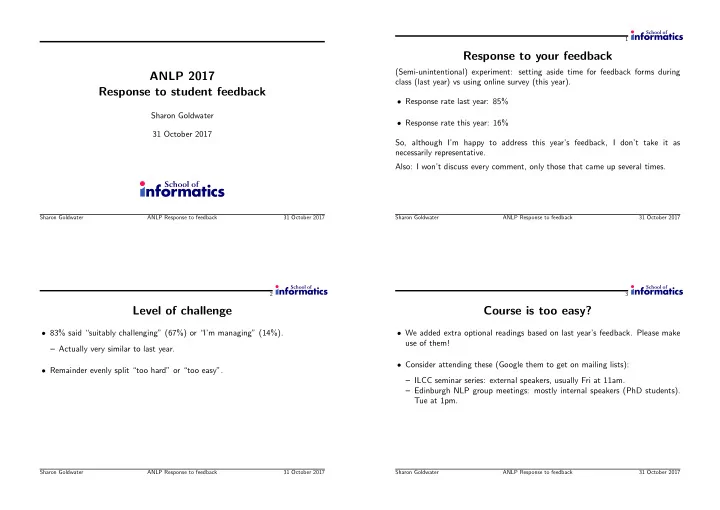

1 Response to your feedback (Semi-unintentional) experiment: setting aside time for feedback forms during ANLP 2017 class (last year) vs using online survey (this year). Response to student feedback • Response rate last year: 85% Sharon Goldwater • Response rate this year: 16% 31 October 2017 So, although I’m happy to address this year’s feedback, I don’t take it as necessarily representative. Also: I won’t discuss every comment, only those that came up several times. Sharon Goldwater ANLP Response to feedback 31 October 2017 Sharon Goldwater ANLP Response to feedback 31 October 2017 2 3 Level of challenge Course is too easy? • 83% said “suitably challenging” (67%) or “I’m managing” (14%). • We added extra optional readings based on last year’s feedback. Please make use of them! – Actually very similar to last year. • Consider attending these (Google them to get on mailing lists): • Remainder evenly split “too hard” or “too easy”. – ILCC seminar series: external speakers, usually Fri at 11am. – Edinburgh NLP group meetings: mostly internal speakers (PhD students). Tue at 1pm. Sharon Goldwater ANLP Response to feedback 31 October 2017 Sharon Goldwater ANLP Response to feedback 31 October 2017
4 5 Course is too hard? Side note: linguists versus others • Make sure you are actually spending the recommended time outside lectures: • We usually get somewhat higher difficulty ratings from students with linguistics 8-10 hours/wk minimum! background. • “I’ve done the readings and exercises, but I still don’t get the point”, or “I just • However, whenever we have looked at the final exam marks, we haven’t found feel lost and don’t know what to ask.”: any differences. – We do try to explain the bigger picture in lecture and in tutorials (check the • Previous students on SLP degree said later that they appreciated being pushed answer sheets too!). in the first semester, to better prepare for sem 2. – If you are still confused, (a) talk to your fellow students, and (b) come to TA hours! No, really! • If you feel the linguistic parts are going too slowly, use the time to catch up on the other parts! (Linguistics isn’t as easy as you think for everyone else.) Sharon Goldwater ANLP Response to feedback 31 October 2017 Sharon Goldwater ANLP Response to feedback 31 October 2017 6 7 What works well and what doesn’t? Labs: logistics • Students mentioned many positive points (thank you!) • Please do more to get the non-ANLP students out. It’s hard for me to find a seat/partner. – labs, tutorials, assignments – textbook/reading – Thanks, we’ll try to do better with this. – course organization – But maybe: instead of immediately sitting down, consider waiting by the – lectures and lecture videos door for a partner and sitting down with them. – discussing/working with other students – And we’ll probably try for more smaller labs next year. • The most common issues were related to: – labs – lecturers – working with partners Sharon Goldwater ANLP Response to feedback 31 October 2017 Sharon Goldwater ANLP Response to feedback 31 October 2017
8 9 Labs: Content Lectures: delivery and logistics • Labs are too hard. • Please make slides available in advance • Labs are too easy. • Please don’t skip over slides or rush through them – Inevitable difference between student backgrounds. – We try but it is sometimes hard, especially in the sections where lots of – Attendance is not compulsory. If you really don’t like them, don’t go. But content is being updated from last year. We will continue to do what we you are still responsible for the content, so do look over them on your own. can. • Labs should be more connected to assignments. • Please don’t talk so fast – Some of the labs already are (Lab 3 and 8). – I’m aware I do sometimes; I’ll try not to! – But we’ll consider possible improvements for next year. Sharon Goldwater ANLP Response to feedback 31 October 2017 Sharon Goldwater ANLP Response to feedback 31 October 2017 10 11 Lectures: content Partners • Please say more about your own experience with NLP/research. • My partner didn’t do any work. • My partner wouldn’t let me do any work. – SG won’t be doing that this year, but DG probably will. Also we have some other guest lecturers to do this. – We’ve found that most students like working with a partner, but it is expected that not all partnerships will work well (one reason we make you switch). Nevertheless... Sharon Goldwater ANLP Response to feedback 31 October 2017 Sharon Goldwater ANLP Response to feedback 31 October 2017
12 Why partners? Dealing with difficult partnerships is unpleasant, but also important. (You don’t often get to choose your coworkers, and these experiences do come up in job interviews!) • If your partner really refuses to work, not much you can do. • Others want to help, just need more patience. – Practicing explaining things will improve your own communication skills. – It may help you discover your own mistakes. – They may very well have good ideas and you will likely end up with a clearer report if you both understand it. • You do have the option of working alone, however we have found lower average marks in the past for singletons. Sharon Goldwater ANLP Response to feedback 31 October 2017
Recommend
More recommend